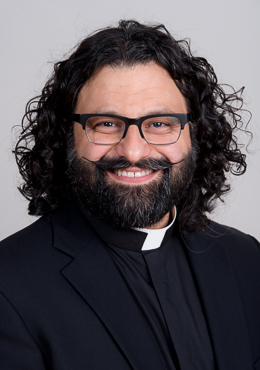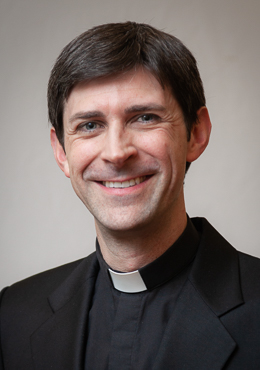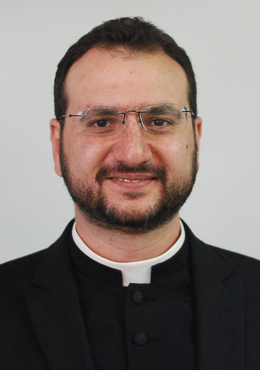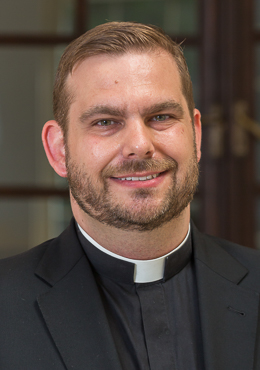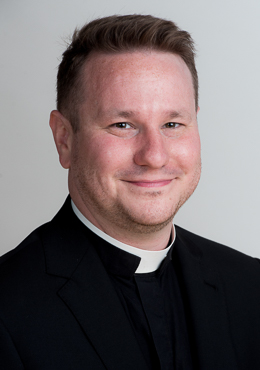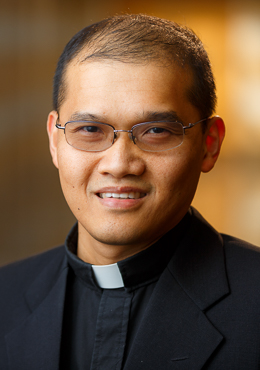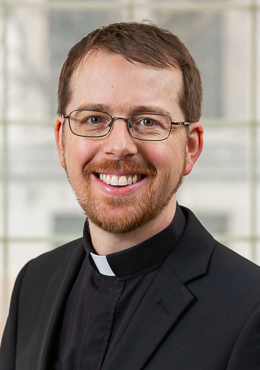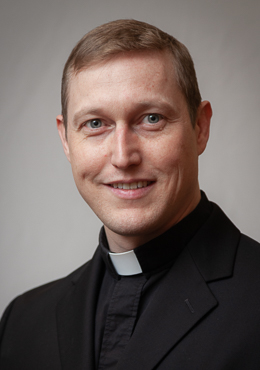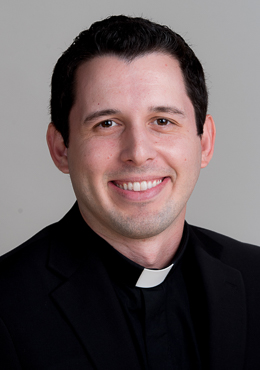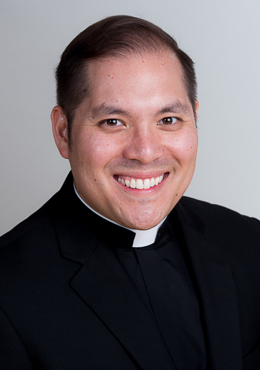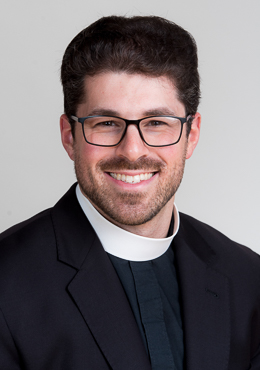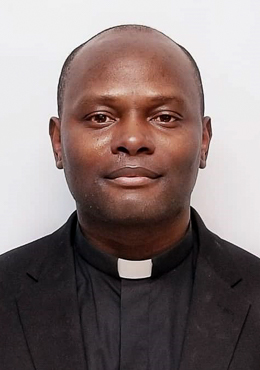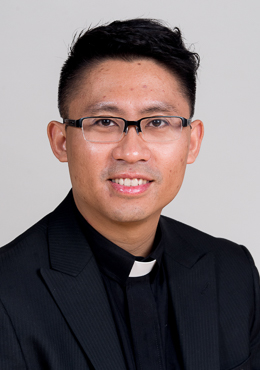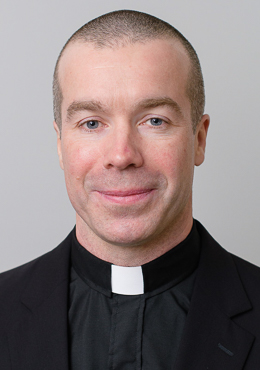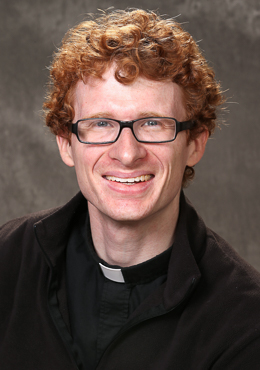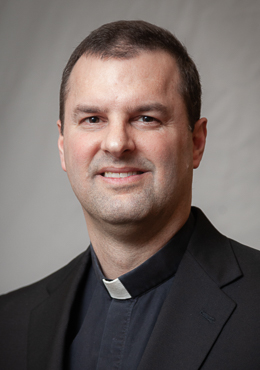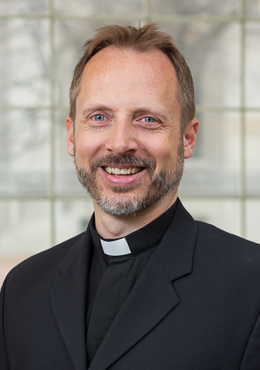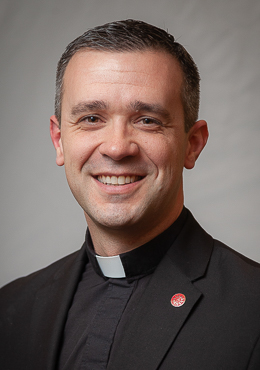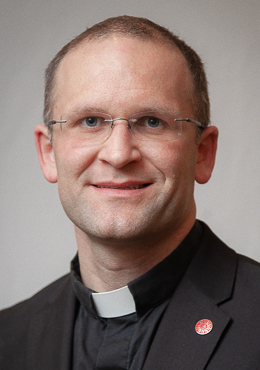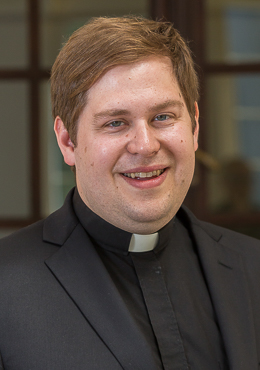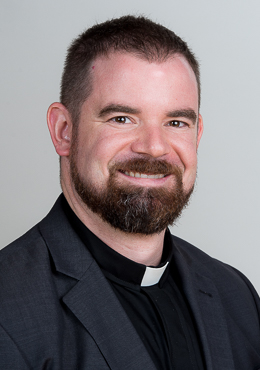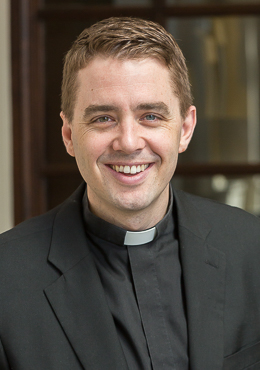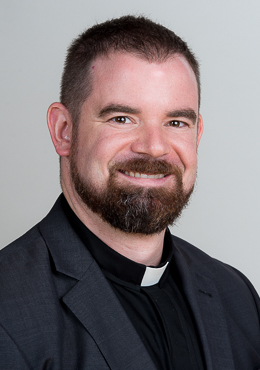
Province: USA Midwest
Birthday: September 19, 1985
Hometown: Cincinnati, Ohio
Education:
Bachelor’s degree, history and philosophy, Fordham University
Master’s degree, history, Saint Louis University
Master of Divinity, Jesuit School of Theology of Santa Clara University
Highlights of Jesuit Formation:
Worked in parishes on the Pine Ridge Reservation in South Dakota
Taught history and religious studies, coached debate and boys’ and girls’
sprinters at Brebeuf Jesuit Preparatory School in Indianapolis, Indiana
Ministered at San Quentin State Prison, working with the “mainline” and death
row populations
Post-Ordination:
Will serve
as an associate pastor at St. Joseph-St. Francis Xavier Parish and assist at Loyola Academy in Wilmette, Illinois
Biography:
Matthew C. Spotts, SJ, was born on a U.S. Air Force base in West
Germany but did most of his growing up in Cincinnati, Ohio. His family was
active in the parish at St. Elizabeth Ann Seton, where Matt also attended
grammar school. He first met the Jesuits at St. Xavier High School in
Cincinnati and he continued his Jesuit education at Fordham University in the
Bronx, New York, where he earned a bachelor’s degree with concentrations in
history and philosophy. After graduating from Fordham in 2008, Matt entered
what was then the novitiate in Berkley, Michigan. Among his experiences as a
novice, Matt spent his long experiment working in parishes on the Pine Ridge
Reservation. After taking first vows, Matt moved to St. Louis where, in
addition to studies in philosophy and theology, he completed a master’s degree
in history, concentrating in early modern European history. His research
focused on the religious cultures of Reformation-era Europe. He also worked
with the young adult St. Vincent de Paul chapter at Saint Louis University’s
College Church. His next mission took him to Brebeuf Jesuit Preparatory School
in Indianapolis, Indiana. There, from 2013-2016, Matt served as a teacher,
teaching courses including AP European history and world history, New Testament,
introduction to philosophy and introduction to religious studies. He also
coached boys’ and girls’ sprinters for the track team and various styles of
debate. In 2016, Matt moved to theology studies at the Jesuit School of
Theology in Berkeley, California. Outside of his studies, Matt loved his work
at his ministry placement at San Quentin State Prison, where he worked with
both the “mainline” and death row populations. During his year as a deacon, he
also was able to serve at Our Lady of Lourdes Parish in Oakland while
continuing his work at San Quentin. (USA
Midwest Province)
What’s one interesting fact about yourself not everyone would know?
My friends
knew enough about my fondness for the Harry Potter novels that they threw me a
Harry Potter-themed birthday party for my 30th birthday.
What was one particularly meaningful experience you had during your
formation, and why was it meaningful to you?
On the
Saturday before Passion Sunday 2018, I went into San Quentin State Prison to
preside at a Communion service on death row. As was our practice, we read the
readings for the following Sunday, which meant that we were reading the
Passion. For a variety of reasons, only one man was there when I got to the
chapel, an unusually small number that left me momentarily annoyed, most of all
at the systemic reasons that made it hard for the men on death row to go to
services. However, we began, prayed and read the Passion together.
When we concluded, I looked up and saw the man in tears. It occurred to me that, while I was lost in disappointment that more men didn’t make it to the chapel that day, I had allowed myself to forget the bigness of what we were doing: I was reading the story of Jesus’ arrest, trial, imprisonment and execution with a man awaiting his own execution. I had let myself forget that he might see the experience of Jesus in a way that I did not and could not.
He didn’t say all that. All he said, wiping tears from his eyes, was “I’m sorry I’m crying, but I don’t get to do that too often.”
I don’t know what God touched in him that day. But I do know that God was deeply, profoundly present with us who were gathered in God’s name. And it touched me — it was a reminder that God's profound movements in the human heart have nothing to do with the number of people there. Sometimes the biggest movements will always remain hidden. But they're there and God is always at work, and every now and then, I get to see God at work.

Matt at San Quentin State Prison in San Quentin, California, where he ministered.
What is your favorite
book, movie, music, or TV show you’ve encountered since entering the Society
and why do you love it?
At its height, my love of “Downton
Abbey” was pretty much limitless. As part of my love of history, I have an
affection for historical period dramas anyway, and the quality of “Downton
Abbey” in one of my favorite genres was enough to make me overlook the fact
that this was, at bottom, a very high production value soap opera. One
memorable summer, several other Jesuit scholastics and one Jesuit brother
watched the series while we were interning at the former Jesuit retreat center
at Inisfada, which looked a lot like a Downton Abbey-style house!
What are three words a
family member or fellow Jesuit would use to describe you? (Ask someone.) Do you
agree with his or her selections?
I polled my three siblings and two
siblings-in-law. Here’s what they came up with: loyal, loving, uncle; thoughtful,
loyal, fun; passionate, joyful, fun; compassionate, just, charismatic; and empathetic,
intellectual, learner.
While I can’t be my own judge, I suspect that they’re being way too kind for me and reserving the teasing for somewhere less public. Except for the uncle one ... I really love being an uncle!
Who’s your favorite
saint, and why?
St. Mary Magdalene. I’m captivated
by the scene in John’s Gospel when Jesus appears to her after the Resurrection
and sends her to tell the other disciples. For a short, precious time, she was
the only human being who knew the most important truth the world had ever known,
that Jesus had been raised from the dead. What would it have felt like to be in possession of
that truth, to know that she was the only one who knew? How does it change my
life, our life, to know that this is the same truth that Christians know and
proclaim? It’s a meditation that’s delighted and challenged me many times in
recent years.
What is one hobby you’ve cultivated as a
Jesuit and why is it important to you?
While exercise has always been part of my
routine, it became a more urgent part of my routine when I was coaching
sprinters for Brebeuf Jesuit’s track team. I’m not sure the sprinters (who
included some pretty impressive athletes!) would have taken me very seriously
if I wasn’t in respectable shape! More importantly, much of my ministry,
whether in the high school classroom or the prison chapel, has been head and
heart work. I dearly love that about life and ministry as a Jesuit. However, in
the midst of that, lifting weights or long hikes became a way to not forget my
physical self in the midst of serving God’s people through the head and heart.
What do you love about
the Society of Jesus?
I get to serve God’s people,
wherever God leads. In the course of the last six years, I spent three years as
a teacher and coach at Brebeuf Jesuit Prep in Indianapolis. I taught a huge
variety of courses, ranging from AP European history and a senior elective in philosophy
down to freshman world history and freshman introduction to religious studies.
I coached track and debate, working with incredibly talented young people along
the way.
In the midst of all that, I got to help young people discover and cultivate their God-given talents and begin to explore how God might be calling them to put those gifts and talents at the service of a world that needs them. There were many things to love about the experience, but one of those reasons is that it was a deeply hopeful experience seeing how God worked in the lives of these young people.
However, in that same six-year window, I also spent over two years working in prison ministry at San Quentin State Prison. My work there has included teaching RCIA classes, spiritual conversations, cell-front ministry, coordinating Sunday liturgies and presiding at Communion services on death row.
On the surface of it, prison work could not be more different than high school work. After all, the students were just beginning their lives, just beginning to see how they could make a positive difference in the world with their many gifts and talents.
Conversely, the prisoners at San Quentin are almost all serving long sentences, frequently having been convicted for serious crimes. Their lives have taken a turn that will change and alter the course of the rest of their lives, as well as the lives of many other people. The men often battle cycles of shame and despair. They struggle to see themselves as more than the worst thing that they have ever done, to remember that despite the (sometimes dramatic) brokenness that has often been a part of their lives, they are a beloved child of God.
They struggle with their past and they struggle with their present, including the brutal realities of prison life. And in the midst of that, God is very active. My role as a minister there is simply to help the men continue to discover the many ways in which God is active in their life, which has led to witnessing incredible experiences of grace, reconciliation, freedom and mercy.
The answer to the question “what do I like about the Society of Jesus” is in some way as simple as this: Where else could I be part of two such extraordinary ministries in such a short time? There are not many lives in which I could follow God wherever God leads, only to discover God working in such wonderful, various ways.

Matt (right) cooking dinner with Perry Petrich, SJ, for their fellow Jesuit community members.
How has your
spirituality changed since entering the Society?
In a way, not very much: key
elements of the spirituality remain the same. I still use Ignatian styles of
imaginative contemplation, I still do the examen, I still go to Mass and
participate in the liturgical life of the church. What’s changed is me.
From the very first experiment in the novitiate, every stop along the way has introduced me to God’s people, people who have shared their lives with me and invited me in to set foot on the holy ground of their lives, the ground where they meet God. That, I think, can’t help but change my prayer. If I truly pay attention to the lives people share with me, the joys and struggles, the things that make them laugh and cry, the things they celebrate and the things that cause despair, my spirituality almost has to change.
As time has gone by in the Society, it becomes harder and harder to read and pray with Scripture without hearing the voices of people I’ve known and seeing their stories in the sacred stories of Scripture. Those stories are also part of my intimacy with God. There was never a time where my prayer was “just me and Jesus,” but it’s even less so today.
When I see and hear the stories and voices of people I’ve known in the scripture, it draws me even closer to God because God and I have known the same people, and it helps God and I to deepen our relationship to discuss the wonderful things going on in the heart of people we both have known.
Imagine you could
travel back in time and meet yourself the first day you entered the Society of
Jesus. What’s one piece of advice you’d give to yourself?
I wouldn’t say a word. I wouldn’t
want to take even the slightest chance of spoiling the surprises that were
ahead.
What brings you joy?
As simple as this is, it gives me
joy to watch the unexpected, amazing things that God does with people. Before I
entered the Jesuits, I think I probably thought that ministry was mostly about
giving something to people. If formation has made anything clear, it’s that God
is already at work in the lives of people in extraordinary ways.
So, whether I’m helping a student discover a talent for thinking through a historical question and coming to understand the world in a new way; helping an athlete find a way to set a new personal best; sitting with a spiritual directee as she makes a breakthrough in her relationship with God; or accompanying a prisoner as he makes a leap in understanding his faith, I've come to realize that God was there and working long before I got there.
It's exciting because God's dreams and plans for people are usually bigger and better than anything I would have come up with. I’ve learned over time that what God does with a person is usually vastly better than what I could have intended or planned. And it’s a great joy to get to see what God does with God’s people, to see how people’s lives are changed and are never the same again.
Who is one important
mentor who has accompanied you on your journey? What made them a good mentor?
Like many Jesuits before me, my
regency was spent teaching high school, a mission for which I was incredibly
excited, but also a job I had never done before and for which I had only about
a summer of direct training and preparation. Fortunately, I had an entire
building full of exceptional educators at Brebeuf Jesuit Prep who took me under
their wing and were unfailingly patient with my questions, concerns and
flounderings in my first year.
Among these, JD Ferries-Rowe and Jen Lamaster stand out. They were incredibly helpful in terms of learning how to teach as well as how to navigate the other parts of working in a secondary school. They helped me cultivate attitudes and habits about secondary education that continue to form and inform my passion for high school ministries today. And just as important as all of that, they became good friends. I would have had many fewer laughs in my life without them.
